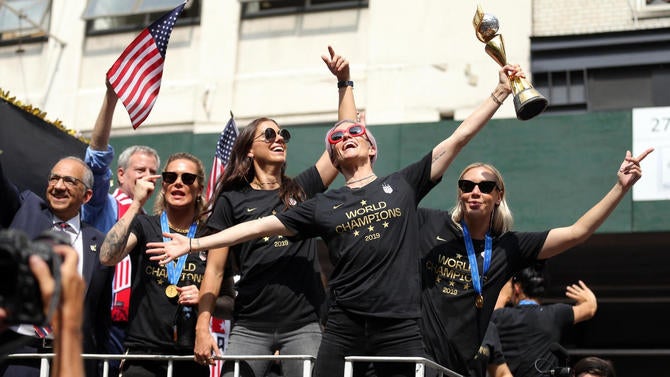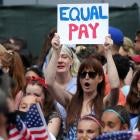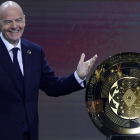Players on the United States Women's National Team are World Champions, but winning the World Cup has not been the only victory this team has been striving for. The USWNT is asking for pay equal to the men's team, which has the same responsibilities as the women's team. The team filed a lawsuit earlier this year and chants of "equal pay" were heard both at the World Cup and during the team's victory parade in New York City.
So where do things stand in the players' fight for pay equity? Here's everything you need to know about the USWNT's lawsuit, what's been said about it and what's next.
The Lawsuit
All 28 members of the current USWNT roster filed a class-action lawsuit against the U.S. Soccer Federation on March 8, which is International Women's Day. The suit was filed in Los Angeles federal court under the Equal Pay Act and Title VII of the Civil Rights Act.
The U.S. Women's National Team Players Association was not involved in the lawsuit but said it "supports the plaintiffs' goal of eliminating gender-based discrimination by USSF."
Forward Christen Press told The Associated Press, "We believe it is our duty to be the role models that we've set out to be and fight to what we know we legally deserve, and hopefully in that way it inspires women everywhere."
Here are some details from the lawsuit:
- The women are paid less than the men despite performing similar job duties for the same employer and outperforming the men — at times earning more profit for the federation, playing more games, winning more games, winning more championships and garnering higher television ratings. To support that claim, the lawsuit cites the women's (then) three World Cup titles, four Olympic gold medals, No. 1 rank in the world for 10 of the 11 last years and the 2015 World Cup title game being the most-watched soccer game in American TV history at the time.
- The women actually spend more time in training camps and playing games than the men because of this success. From 2015-18, the women played 19 more matches than the men.
- In addition to unequal pay, the lawsuit says the federation provides unequal playing, training and travel conditions, and unequal promotion for games.
Examples cited: From 2014-17, the women played 21 percent of their domestic matches on artificial turf compared to two percent for the men. In 2017, the USSF chartered at least 17 flights for the men and none for the women. Lower ticket prices and less promotion of women's matches led to "USSF-manufactured revenue depression." - When the USWNT players association negotiated a new collective bargaining agreement, which took effect Jan. 1, 2017, and runs through 2021, the USSF rejected requests for equal compensation and also turned down a proposed "revenue-sharing model" that would test the federation's claim that "market realities" do not justify equal pay for women. "Under this model, player compensation would increase in years in which the USSF derived more revenue from WNT activities and player compensation would be less if revenue from those activities decreased. This showed the players' willingness to share in the risk and reward of the economic success of the WNT," the lawsuit says.
According to the lawsuit, in general, a top women's player could earn as little as 38 percent of what a star men's player with a gap of $164,320.
The women break down inequalities in the suit saying that if they won 20 non-tournament games in a year the top players would earn a maximum of $99,000 while a men's star doing the same thing would earn an average of $263,320.
A 2017 collective bargaining agreement with US Soccer in 2017 started closed the pay gap for non-tournament play making it so the women would earn $28,333 less for non-tournament games, but the women say there are still a lot of improvements to be made on the equality front.
They also note that in 2014 the federation paid the men's team $5.375 million in bonuses in the World Cup, despite being eliminated in the round of 16, while the women got $1.725 million after winning the whole thing in 2015.

What the players are asking for
USWNT players are seeking equitable pay of their male counterparts as well as asking for back pay damages. They want change and want to be the voice for women seeking equality in other occupations, as well as for female soccer players of the future.
The players say they have been subject to "institutionalized gender discrimination" and are asking for that to change.
The lawsuit says there have been violations of the Equal Pay Act, which prohibits wage discrimination between men and women who perform similar jobs, and Title VII of the Civil Rights Act of 1964, which prohibits employers from discriminating against employees based on sex, race, color, national origin and religion and they are demanding a jury trial for the case.
They are also asking for equal support and development for their games, as well as fair travel, training and game promotions as described in the lawsuit details above.
Who said what
Here's what the 2019 team's trio of co-captains, Megan Rapinoe, Carli Lloyd and Alex Morgan, had to say about the lawsuit after it was filed.
Rapinoe: "At the heart of this whole issue we believe that it's the right thing. We believe that there has been discrimination against us, and while we have fought very hard and for a long time, whether that be through our CBA or through our players association, putting ourselves in the best possible position that we can to get the best deal that we can, we still feel that we don't have what we're trying to achieve, which is equality in the workplace."
Lloyd: "In light of our team's unparalleled success on the field, it's a shame that we still are fighting for treatment that reflects our achievements and contributions to the sport. We have made progress in narrowing the gender pay gap, however progress does not mean that we will stop working to realize our legal rights and make equality a reality for our sport."
Morgan: "Each of us is extremely proud to wear the United States jersey, and we also take seriously the responsibility that comes with that. We believe that fighting for gender equality in sports is a part of that responsibility. As players, we deserved to be paid equally for our work, regardless of our gender."
During their championship parade the team, and their fans, kept a spotlight on the equal pay issue. Fans showed up with signs asking for equal pay and chanted "equal pay" along the route.
Crystal Dunn’s sign: Parades are cool — equal pay is cooler!! #WNTParade
— Jennifer X. Williams (@JenXperience) July 10, 2019
(🎥: @SamiYewman) pic.twitter.com/Q1tKH17qis
U.S. Soccer President Carlos Cordeiro spoke at the parade -- and was interrupted by fans with "equal pay" chants. "We hear you. We believe in you. And we're committed to doing right by you," Cordeiro said, without getting into any specifics about what the federation planned to do.
During her parade speech, Rapinoe looked to Cordeiro -- who she believes is on the women's side, and will do the right thing -- and said that players will hold his feet to the fire. She called out to everyone asking them to be better to their community and "love more, hate less".
What the federation claims
The U.S. Soccer federation has explained the pay inequality is caused by separate collective bargaining agreements.
The USWNT has a guaranteed salary rather than pay-for-play like the men do. The federation says the women have benefits the men's team does not, including healthcare.
Equal pay history
This is not the first time the fight for equal pay has made it to the courts. Alex Morgan, Carli Lloyd, Megan Rapinoe, Becky Sauerbrunn and former U.S. goalkeeper Hope Solo filed a federal complaint with the Equal Employment Opportunity Commission (EEOC) in March 2016. They claimed the federation practiced wage discrimination in violation of Title VII and the Equal Pay Act.
The most recent lawsuit puts an end to the 2016 fight, which was never resolved. On Feb. 5, 2019 the players were issued "Notices of Right to Sue" by the EEOC, receiving them on Feb. 11. In 2016 Carli Lloyd published an essay in the New York Times called "Why I'm Fighting for Equal Pay."
Public Support
After the 2019 World Cup, U.S. Senator Joe Manchin introduced a bill that would withhold federal funding for the 2026 men's World Cup, set to be held partially in the United States, until the women receive equal pay. New York Governor Andrew Cuomo also became an ally for the USWNT when he signed an equal pay bill into law at the parade.
New York Governor Cuomo signs equal pay bill into law at USWNT World Cup victory parade https://t.co/6I32yEpZJH pic.twitter.com/kKwStcQUth
— CBS News (@CBSNews) July 10, 2019
Following the announcement of the lawsuit fans, celebrities, fellow athletes and politicians came to the defense of the women's team.
Fans thanked the team for what they are doing, saying players are inspiring people everywhere.
#USWNTParade Congrats on your big win. May equal pay find you soon. You all inspire me. You inspire us all. pic.twitter.com/qvrsJhmkQw
— KimberlyDewayn (@KimDSummons) July 10, 2019
Snoop Dogg got blunt on social media and said in a video, "pay them girls what they deserve" commenting that the women have had significantly more success in the World cup than the men.
An important PSA from the one and only @SnoopDogg 🗣️ 'Pay them girls what they worth.' #USWNT 🇺🇸 pic.twitter.com/KJCU8xyVSe
— Jackie Padilla (@jackienpadilla) July 9, 2019
U.S. Senator and presidential candidate Kamala Harris recognized the fight goes beyond soccer and called out to companies with pay gaps.
As we celebrate the @USWNT today, it's on us to take up their charge and fight for equal pay. Let's flip the script and hold corporations accountable by requiring them to prove they're not engaging in pay discrimination — and fine companies that fail to close their pay gaps. https://t.co/yydKAm2MYu
— Kamala Harris (@KamalaHarris) July 10, 2019
What's next
The Wall Street Journal reported in June that the women and U.S. Soccer have agreed to mediation in the pay-equity suit. The meeting was agreed to due to the women's team generating "significant revenue", an attorney for the USWNT told the Journal.
Nike recently announced the women's home kits were the highest selling soccer jersey, men or women's, for a single season in company history. This year's women's World Cup final, Netherlands vs. USA, received higher television ratings in the U.S. than last year's men's final, helping the women's case of drawing in significant revenue. The final was the most-watched soccer event in the U.S. since the 2015 women's final with 14 million viewers, according to Nielsen's ratings. Fox also said social media gained a lot of viewership, clocking in at 17.8 million across platforms, beating the men's 2018 final by 18 percent.
According to the Wall Street Journal the women's team brought in more money recently than its male counterpart. The women's games earned $50.8 million in revenue between 2016 and 2018 while the men brought in $49.9 million, reportedly due to ticket sales. The women will use these numbers in their case for equal pay.
![[object Object] Logo](https://sportshub.cbsistatic.com/i/2020/04/22/e9ceb731-8b3f-4c60-98fe-090ab66a2997/screen-shot-2020-04-22-at-11-04-56-am.png)

















